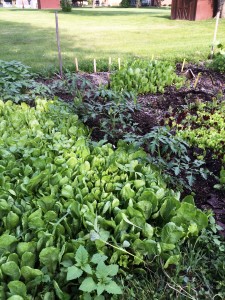In an ideal world, we would have big beautiful green lawns and lush, full blooming gardens with bountiful harvests of fruits and vegetables– and it would be as easy as sticking a plant or seed in the ground. But the reality is, it’s not easy, and it starts with our soil.
 We all know that plants get most of their nutrients from the soil- but most of our soils are not perfect, or have been overworked, or lack all of the nutrients needed. Adding fertilizer – whether organic or manufactured- is a way to add nutrients to the soil and thus provide the fuel your plants need to grow strong roots and produce healthy blooms or fruit. According to fertilizer.org, a website managed by the International Fertilizer Industry Association, the purpose of fertilizer use is twofold: one, to supplement the natural soil nutrient supply and build up soil fertility in order to satisfy the demand of crops with a high yield potential; and two, to compensate for nutrients exported by the harvested products or lost by unavoidable leakages to the environment in order to maintain good soil conditions for cropping.
We all know that plants get most of their nutrients from the soil- but most of our soils are not perfect, or have been overworked, or lack all of the nutrients needed. Adding fertilizer – whether organic or manufactured- is a way to add nutrients to the soil and thus provide the fuel your plants need to grow strong roots and produce healthy blooms or fruit. According to fertilizer.org, a website managed by the International Fertilizer Industry Association, the purpose of fertilizer use is twofold: one, to supplement the natural soil nutrient supply and build up soil fertility in order to satisfy the demand of crops with a high yield potential; and two, to compensate for nutrients exported by the harvested products or lost by unavoidable leakages to the environment in order to maintain good soil conditions for cropping.
Many of us, at the start of the season, mix compost in with our soil. Compost feeds the soil, while fertilizer feeds the plants. So simply adding compost isn’t the same as adding fertilizer, and using both compost and fertilizer together can help you grow the best garden possible. And even if you start with the best possible soil, as your plants grow an absorb nutrients from the soil, the soil becomes less fertile. Plants require six main nutrients: carbon, hydrogen, oxygen, nitrogen, phosphorous, and potassium. The first three they get from air and water, and the last three they must get from either soil or fertilizer. Nitrogen is essential to help plants make the proteins necessary in new tissue production. Phosphorous helps plants transfer energy from one area to another, which helps stimulate root growth, set buds and flowers, and increase seed size. And Potassium is needed by plants to make carbohydrates, and affects the overall vigor and health of the plant. In much smaller amounts, plants need calcium, magnesium, and sulfur from the soil.
Choosing a fertilizer needn’t be tough. Most all-purpose fertilizers are 5-5-5, which indicates the proportion of each macronutrient (nitrogen, phosphorus, potassium). There are organic and synthetic fertilizers on the market, with organic fertilizers usually being slow release and better for fall application, and synthetic being mainly water soluble and fast acting.

Gurney’s has a wide range of fertilizers, from T-I-M-E-D (which releases nutrients over two years) to plant specific fertilizers such as Gurney’s Blueberry Food, Tomato Food, Sweet Corn Food and Fruit Tree Food. Almost as important as the fertilizer is regularly testing your soil pH, as a pH that is too high or too low can cause plants not to absorb readily available nutrients. A soil sample can be sent to a lab, or use a tool such as Gurney’s 4 Way Soil Analyzer to determine soil pH, then work to slowly raise or lower your soil pH over several years, and consider applying compost which helps moderate soil pH and maintain the ideal pH of 6.5.

